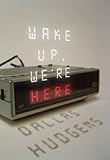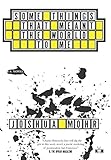1.
 Dallas Hudgens’ short story collection Wake Up, We’re Here arrived, as do half the books I read these days, as an unexpected package on my doorstep. This one’s special, the note from the publicist said. As a general rule, I’m skeptical of such claims, and I have to confess that I’m generally less drawn to story collections than I am to novels. But I happen to know the publicist in question as a freelancer of exquisite taste who only takes on projects that interest her, so I moved the book to the top of the towering pile of books that’s presently threatening to avalanche all over the floor of my office and took it with me on the subway a week later.
Dallas Hudgens’ short story collection Wake Up, We’re Here arrived, as do half the books I read these days, as an unexpected package on my doorstep. This one’s special, the note from the publicist said. As a general rule, I’m skeptical of such claims, and I have to confess that I’m generally less drawn to story collections than I am to novels. But I happen to know the publicist in question as a freelancer of exquisite taste who only takes on projects that interest her, so I moved the book to the top of the towering pile of books that’s presently threatening to avalanche all over the floor of my office and took it with me on the subway a week later.
And you know, the publicist was right. Dallas Hudgens’ Wake Up, We’re Here is easily one of the best books I’ve read this year.


 Some of Hudgens’ work is reminiscent of the fiction of Joshua Mohr, whose three excellent novels to date — Some Things That Meant the World To Me, Termite Parade, and Damascus — chart the lives of the damaged and the down-and-out in America. Hudgens’ stories often involve the clinically nervous, the unable-to-make-it-in-the-world, the damaged and the addicted. In the opening story, “Target,” a middle-aged bar musician enlists his anxiety-plagued daughter to drive the getaway car in a stolen electronics scam. In “Zamboni,” perhaps the most dazzling piece in the collection, a man with a history of drug problems, alcoholism, and petty criminality struggles to find a way to live in the world in the months following his mother’s death; he cared for her for some time before she succumbed to brain cancer. It must have been hard, a friend suggests, being her primary caregiver. “No,” Serge replies, “it was okay. I liked it, you know. It was an honor.” The work is filled with such unexpected moments.
Some of Hudgens’ work is reminiscent of the fiction of Joshua Mohr, whose three excellent novels to date — Some Things That Meant the World To Me, Termite Parade, and Damascus — chart the lives of the damaged and the down-and-out in America. Hudgens’ stories often involve the clinically nervous, the unable-to-make-it-in-the-world, the damaged and the addicted. In the opening story, “Target,” a middle-aged bar musician enlists his anxiety-plagued daughter to drive the getaway car in a stolen electronics scam. In “Zamboni,” perhaps the most dazzling piece in the collection, a man with a history of drug problems, alcoholism, and petty criminality struggles to find a way to live in the world in the months following his mother’s death; he cared for her for some time before she succumbed to brain cancer. It must have been hard, a friend suggests, being her primary caregiver. “No,” Serge replies, “it was okay. I liked it, you know. It was an honor.” The work is filled with such unexpected moments.
Hudgens excels at character development; days after reading the stories I find myself still thinking about Serge, the violence-prone man trying to find his place in “Zamboni”, and Tek, the heartbreakingly awkward musician caring for his senile father in the story “Sounding Brass.” The language is beautiful throughout (“Her neck was long and fragile, a soft note from an instrument that touched his skin.”) Hudgens doesn’t shy away from the brutality of life on earth — the illness, the decreptitude, the humiliations and the teen suicides — but the grittiness is never gratuitous, and his stories are infused with compassion and hope. Happy endings are by no means assured or even particularly likely, but redemption is possible, and the endings of nearly every story in the collection surprised me.
Who published this thing? Hudgens’ bio listed a couple of books published by Scribner, but the imprint on this one was listed as Relegation Books. A small press, I assumed, but I couldn’t find it online. Had Hudgens published the book himself? I’d noticed that the book seemed not to have been copy-edited (“’Give me ten mintues,’ he told her”), but on the other hand, the book looked approximately a thousand times more professional than any of the other self-published book I’d ever seen, and I’ve seen that kind of typographical error in books published by the largest publishers on earth. I emailed the publicist. Yes, she said, he’d published it on his own.
It’s extremely rare for The Millions to cover a self-published book, but that’s not a matter of editorial policy, and my personal feeling on the matter is that all that actually really matters is whether a given book’s any good. In the case of Hudgens’ short story collection, I think the writing’s remarkable. I was curious about why a guy who’d published two novels with Scribner would strike off on his own, so I wrote to the author.
2.
Hudgens published two novels with Scribner, and then they declined their option on Wake Up, We’re Here. He was disappointed, but he understood: publishing is a business, and Scribner was making a business decision.
Short story collections can be a tough sell in the United States. Conventional wisdom is that they tend to sell fewer copies than novels, which of course might be a bit of a self-fulfilling prophecy: it’s not beyond the realm of possibility that short story collections have, generally speaking, fewer resources directed toward them by skeptical marketing departments who’ve been told that short story collections don’t sell very well. An editor at a recent party I attended told me rather wistfully that he tries to publish a couple of short story collections every year; the implication was that he’d publish more of them if he could.
Hudgens told me that he’d always been drawn more strongly to short stories than to novels. The collection meant a lot to him, but he realized there might not be an audience for his book. Perhaps, he reasoned, this was the end of a particular moment in his life. Perhaps the period of his life wherein he published fiction was drawing to a natural close. “I was grateful to Scribner,” he said, “and especially my editor, Brant Rumble, for the opportunity to publish two novels.
I thought I’d accepted the fact that I hadn’t found an audience for the story collection. I also thought it made sense to step away from writing and to focus that energy somewhere else. But it was hard to stop writing. After a couple of months, I went back to work on the stories. And, of course, the more I wrote and the more I worked on the collection, I found myself hoping again that there might be an audience for the book.
He thought perhaps a smaller publisher would be a better fit for the collection. He started querying, but had singularly bad luck: the one small publisher who expressed an interest went out of business soon after. He tried submitting the stories to journals and magazines, in the hopes of attracting the attention of other publishers, but — this part’s baffling to me — none of the stories were accepted for publication.
This was when Hudgens began to consider publishing the collection himself. He’d long been interested in the idea of publishing his own work, and ereaders and advances in print-on-demand technology had somewhat lowered the distribution barrier. “I’d spent quite a few years asking editors and publishers to take a chance on my writing,” he said. “It felt like the right time to take that chance myself.”
He hired an editor and a cover designer, and set about learning the details of print-on-demand and purchasing ISBN numbers. He came up with a name, Relegation Books.
Since I have the trade name and business license, I sometimes think that it would be nice to keep Relegation Books going in the future. I don’t know if it would be possible to operate as a small press and publish other writers, but I like to think of Wake Up, We’re Here as the test subject. It’s still early in the process, and I’m learning as I go along. If nothing else, I’ll be able to share my experience with other writers who might be considering this approach. The experience, so far, has been very satisfying.









